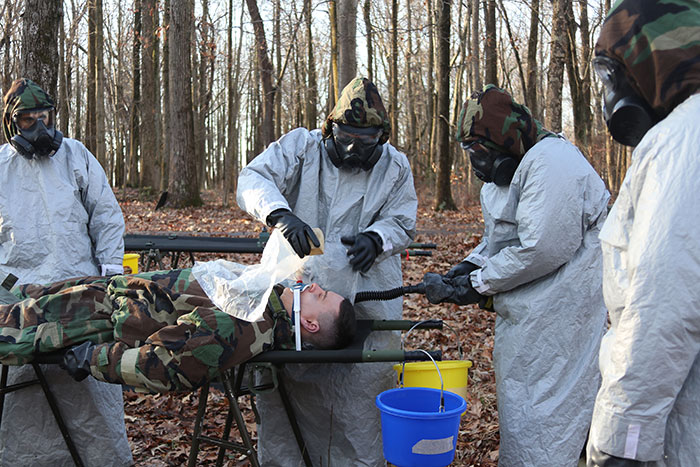Pushed by Pandemic, USAMRDC Puts New Spin on Key Training Courses

Coleman Erwin knew there was a problem when the first cancellation came through. At the start of the novel coronavirus pandemic, Erwin, who serves as the Training and Research Nurse with Division of Medicine at the U.S. Army Medical Research and Development Command's (USAMRDC) U.S. Army Medical Research Institute of Infectious Diseases (USAMRIID), watched as the first of many in-person medical training courses were shut down due to safety concerns. When the Medical Management of Chemical and Biological Casualties (MCBC) course — perhaps the most important of the bunch — fell by the wayside back in May, that's when the red flag went up.
According to Erwin, there was only one solution available.
"We wanted to quickly shift gears to facilitate our mission of providing continuing education [...] in a safe, effective manner," said Erwin of the efforts to continue the training courses.
The plan, of course, was to go "virtual" — to continue the full suite of MCBC classes in a fully online environment. But unlike so many other aspects of life this year — such as, say, ordering a movie or getting your groceries delivered — the MCBC coursework is a uniquely hands-on affair. After all, many of the individuals who take the training (physicians, nurses, and emergency medical technicians, to name a few) do so to satisfy core educational requirements or to maintain key qualifications at various installations across the Army. In a normal year, both USAMRIID and the USAMRDC's U.S. Army Medical Research Institute of Chemical Defense (USAMRICD) team up to host eight such offerings of the course.
That's where the creative part comes in. Battling a global pandemic on one side and bound by strict medical guidelines on the other, the teams at both USAMRICD and USAMRIID completely reimagined the MCBC course syllabus in just weeks by employing a vibrant mix of both in-depth video instruction and virtual classroom work. By modifying presentation styles, shooting a series of videos — in which Soldiers notably served as the actors — and developing fresh distance-learning products, the combined teams were able to translate the in-person experience to a different platform.
The final product has been met with overwhelming approval.
"While I was initially concerned that I would be missing out by being limited to a virtual course, [MCBC] was a remarkable experience that allowed me to learn from the military's top experts in the fields of chemical and biological defense," said Marisa Tuszl, a Master's student at George Mason University (GMU) who participated in the virtual class over the summer as part of a partnership effort between USAMRDC and the university.
Tuszl was one of four GMU students who attended the class under the guidance of GMU assistant professor Gregory Koblentz, who also serves as the Director of the Biodefense Graduate Program at GMU's Schar School of Policy and Government. For both student and teacher, the final virtual product transcended any preconceived notions about web-based learning.
"I give a lot of credit to the instructors for making their session very engaging despite being limited to a virtual mode of education," said Koblentz, who, in what may portend the future of such distance-learning, has seen a 300 percent increase in applications to his program just in the past several months in light of the pandemic. "It reinforced [the students'] interest in this area."
Erwin credits myriad USAMRICD and USAMRIID team members for the nitty-gritty work — repurposing video content made prior to 2020, refining didactic portions of the course for Internet use, and condensing certain materials due to size constraints, among other tasks — required for the training to be such a success. While the online format was not naturally conducive to practicing the proper way to don a gas mask or learning how to run a decontamination site, Erwin notes the importance of the information was the key driver for the massive shift in teaching approach.
"Having this knowledge is very important to unit readiness and preparedness," said Erwin, "as well as instilling a greater sense of confidence in our medical professionals."
In the end, the grand effort to overcome the limitations of the pandemic — that original problem Erwin and others spotted all those months ago — has yielded strong results. For both Erwin and the respective teams at USAMRICD and USAMRIID, the work in transforming the MCBC course was just one more example of meeting (and exceeding) the challenges of the pandemic.
Said Erwin, "While I am really glad we were able to flex to meet the need, I am also excited for the opportunity of resuming in-resident learning and our mobile training options."
 An official website of the United States government
An official website of the United States government
 ) or https:// means you've safely connected to the .mil website. Share sensitive information only on official, secure websites.
) or https:// means you've safely connected to the .mil website. Share sensitive information only on official, secure websites.


